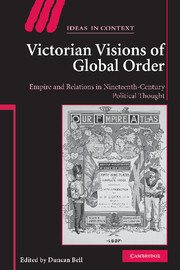 Victorian Visions of Global Order
Victorian Visions of Global Order Book contents
- Frontmatter
- Contents
- Contributors
- Chapter 1 Victorian visions of global order: an introduction
- Chapter 2 Free trade and global order: the rise and fall of a Victorian vision
- Chapter 3 The foundations of Victorian international law
- Chapter 4 Boundaries of Victorian international law
- Chapter 5 ‘A legislating empire’: Victorian political theorists, codes of law, and empire
- Chapter 6 The crisis of liberal imperialism
- Chapter 7 ‘Great’ versus ‘small’ nations: size and national greatness in Victorian political thought
- Chapter 8 The Victorian idea of a global state
- Chapter 9 Radicalism and the extra-European world: the case of Karl Marx
- Chapter 10 Radicalism, Gladstone, and the liberal critique of Disraelian ‘imperialism’
- Chapter 11 The ‘left’ and the critique of empire c. 1865–1900: three roots of humanitarian foreign policy
- Chapter 12 Consequentialist cosmopolitanism
- Index
- Ideas in Context
Chapter 6 - The crisis of liberal imperialism
Published online by Cambridge University Press: 22 September 2009
- Frontmatter
- Contents
- Contributors
- Chapter 1 Victorian visions of global order: an introduction
- Chapter 2 Free trade and global order: the rise and fall of a Victorian vision
- Chapter 3 The foundations of Victorian international law
- Chapter 4 Boundaries of Victorian international law
- Chapter 5 ‘A legislating empire’: Victorian political theorists, codes of law, and empire
- Chapter 6 The crisis of liberal imperialism
- Chapter 7 ‘Great’ versus ‘small’ nations: size and national greatness in Victorian political thought
- Chapter 8 The Victorian idea of a global state
- Chapter 9 Radicalism and the extra-European world: the case of Karl Marx
- Chapter 10 Radicalism, Gladstone, and the liberal critique of Disraelian ‘imperialism’
- Chapter 11 The ‘left’ and the critique of empire c. 1865–1900: three roots of humanitarian foreign policy
- Chapter 12 Consequentialist cosmopolitanism
- Index
- Ideas in Context
Summary
INTRODUCTION
Recent studies of nineteenth-century political thought have focused on the salient relationship between liberalism and empire in this period. Scholars have sought to understand how liberalism, ostensibly grounded in universal and democratic principles, generated, at the same time, political and ethical justifications of imperial rule. In exploring this paradox, studies of ‘liberal imperialism’ have investigated tensions in liberalism that could justify a variety of forms of political exclusion. However, this exclusive focus on justifications of empire has tended to elide the ways in which liberalism and its relationship to empire underwent fundamental transformations throughout the nineteenth century. This chapter focuses precisely on one such transformative moment in imperial ideology, namely the crisis of liberal imperialism during the latter half of the nineteenth century.
In the closing decades of the nineteenth century – at the height of imperial power – moral and political justifications of empire, paradoxically, receded from the forefront of debates about the nature and purpose of imperial rule. Just as British expansion assumed its greatest geographic reach, an ethically orientated political theory of imperial legitimacy, exemplified in the liberal model of imperialism that had dominated British imperial discourse since the early nineteenth century, retreated in significance. Ethical justifications of empire were displaced as new sociological understandings of colonial societies began to function as de facto explanations for imperial rule.
- Type
- Chapter
- Information
- Victorian Visions of Global OrderEmpire and International Relations in Nineteenth-Century Political Thought, pp. 113 - 135Publisher: Cambridge University PressPrint publication year: 2007
- 5
- Cited by
